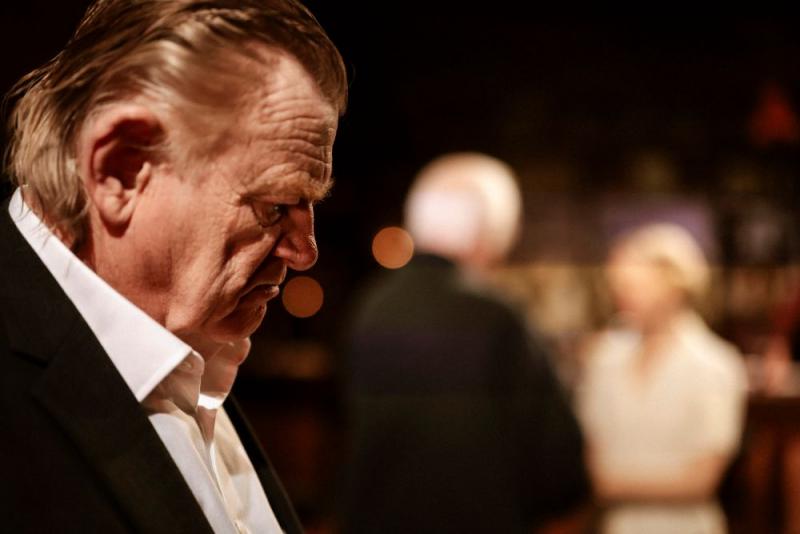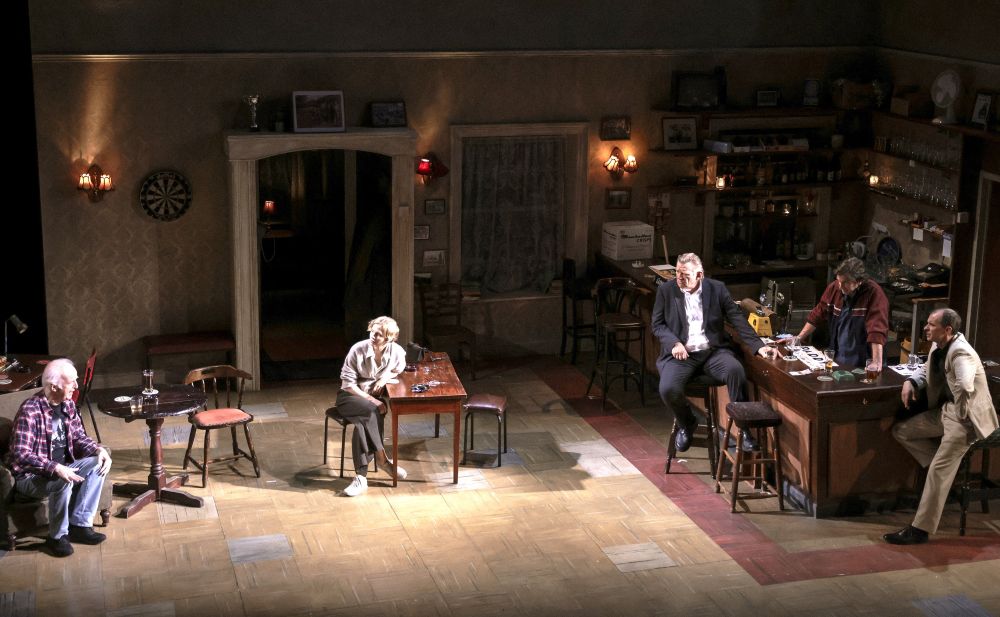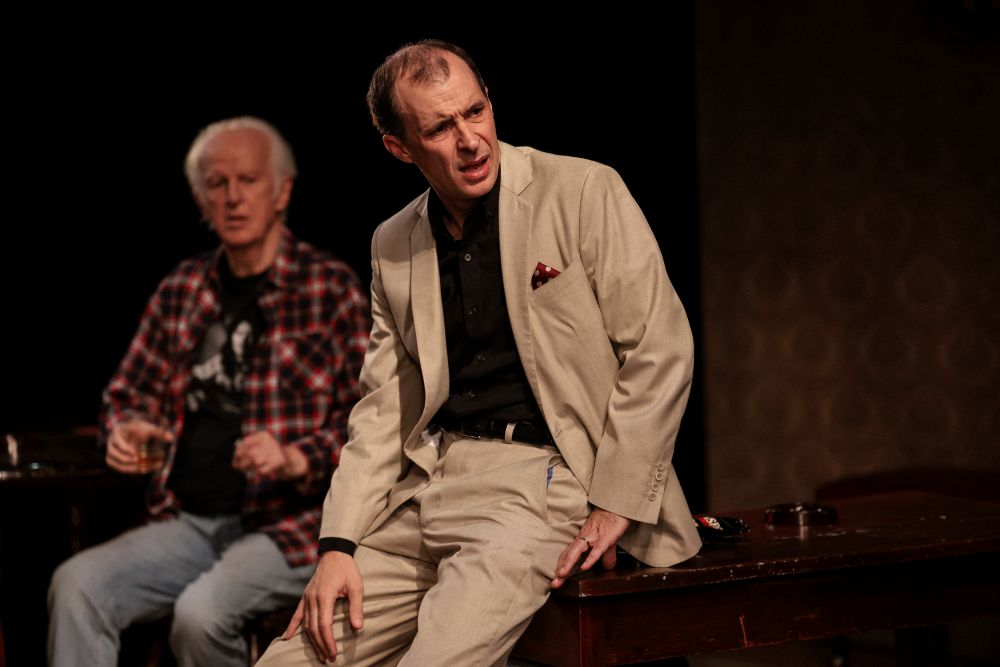The Weir, Harold Pinter Theatre review - evasive fantasy, bleak truth and possible community | reviews, news & interviews
The Weir, Harold Pinter Theatre review - evasive fantasy, bleak truth and possible community
The Weir, Harold Pinter Theatre review - evasive fantasy, bleak truth and possible community
Three outstanding performances in Conor McPherson’s atmospheric five-hander

Why are the Irish such good storytellers? The historical perspective is that the oral tradition goes way, way back, allied to the gift of the gab. On the psychological level, is it partly an evasion, an escape from telling the truth about oneself? The transition from fantasy to honesty in Conor McPherson’s first play of 1997, so much better than his latest, suggests as much.
This new staging of a long-running hit, directed, like that well-acted disappointment The Brightening Air, by the playwright, sustains the atmosphere of curious meetings in a rural Irish pub saloon (perfectly designed by Rae Smith) all the way through to the quiet coda. McPherson’s inspiration was his grandfather Jack, who lived near the river Shannon in a tiny Leitrim hamlet with a weir and a fairy fort. So The Weir has an authenticity akin to Brian Friel's Dancing at Lughnasa. The essence, of an outsider changing an insular group, is similar to that of Enda Walsh's The Walworth Farce and The New Electric Ballroom, but without that genius's strangeness, despite the supernatural element.  There are three outstanding performances, actually four if you also count Owen McDonnell as the barman Brendan, who regrettably is the only one of the five not to tell a tale (you hope he’ll reveal more, but that he doesn’t is part of his laconic nature). Brendan Gleeson as weathered loner Jack gets the most lines, but though inevitably the publicity is built around him, the other fleshcreep story spinners rivet the attention just as surely.
There are three outstanding performances, actually four if you also count Owen McDonnell as the barman Brendan, who regrettably is the only one of the five not to tell a tale (you hope he’ll reveal more, but that he doesn’t is part of his laconic nature). Brendan Gleeson as weathered loner Jack gets the most lines, but though inevitably the publicity is built around him, the other fleshcreep story spinners rivet the attention just as surely.
They’re well contrasted. Gleeson’s Jack is often the quiet man, but threatens to explode at times; Seán McGinley is the real oddball, Jim, whose quality of seemingly vacant stillness is remarkable, and who gets the funniest reaction in the play, to outsider Valerie’s narration (the audience laughed very loud at a lot, which at least suggested McPherson and his performers had them in the palms of their hands). The virtuoso showoffery belongs to Tom Vaughan-Lawlor’s Finbar, whom the others regard as having made it big outside their tiny confines, his jigs and comic turns masking a melancholy which pervades the play. (McGinley and Vaughan-Lawlor pictured below). Finbar has brought to the pub newcomer and refugee from Dublin Valerie, whose presence will eventually shift the mood. Kate Phillips has a luminous presence and her reactions to the three ghost stories are very watchable. But her own speech, which brings the personal to the supernatural, isn’t as real as it could be; I felt the potential for tears, but Phillips’ delivery kept them at an arm’s length, which has nothing to do with the difficulties of sustaining a Dublin accent. So the catalyst for a change of sorts isn’t as strong as it could be.
Finbar has brought to the pub newcomer and refugee from Dublin Valerie, whose presence will eventually shift the mood. Kate Phillips has a luminous presence and her reactions to the three ghost stories are very watchable. But her own speech, which brings the personal to the supernatural, isn’t as real as it could be; I felt the potential for tears, but Phillips’ delivery kept them at an arm’s length, which has nothing to do with the difficulties of sustaining a Dublin accent. So the catalyst for a change of sorts isn’t as strong as it could be.
Gleeson restores it as Jack opens up, and the slow diminuendo to a peace and a hope of sorts is beautifully gauged (congratulations to McPherson for not introducing any music, sentimental or otherwise, after the burst of Strauss’s Fourth Last Song on the radio at the beginning). Nothing obscures the fact that this is the Irish classic so many recent comers have wanted, and failed, to be.
The future of Arts Journalism
You can stop theartsdesk.com closing!
We urgently need financing to survive. Our fundraising drive has thus far raised £49,000 but we need to reach £100,000 or we will be forced to close. Please contribute here: https://gofund.me/c3f6033d
And if you can forward this information to anyone who might assist, we’d be grateful.

Subscribe to theartsdesk.com
Thank you for continuing to read our work on theartsdesk.com. For unlimited access to every article in its entirety, including our archive of more than 15,000 pieces, we're asking for £5 per month or £40 per year. We feel it's a very good deal, and hope you do too.
To take a subscription now simply click here.
And if you're looking for that extra gift for a friend or family member, why not treat them to a theartsdesk.com gift subscription?
more Theatre
 The Weir, Harold Pinter Theatre review - evasive fantasy, bleak truth and possible community
Three outstanding performances in Conor McPherson’s atmospheric five-hander
The Weir, Harold Pinter Theatre review - evasive fantasy, bleak truth and possible community
Three outstanding performances in Conor McPherson’s atmospheric five-hander
 Dracula, Lyric Hammersmith review - hit-and-miss recasting of the familiar story as feminist diatribe
Morgan Lloyd Malcolm's version puts Mina Harkness centre-stage
Dracula, Lyric Hammersmith review - hit-and-miss recasting of the familiar story as feminist diatribe
Morgan Lloyd Malcolm's version puts Mina Harkness centre-stage
 Reunion, Kiln Theatre review - a stormy night in every sense
Beautifully acted, but desperately grim drama
Reunion, Kiln Theatre review - a stormy night in every sense
Beautifully acted, but desperately grim drama
 The Code, Southwark Playhouse Elephant review - superbly cast, resonant play about the price of fame in Hollywood
Tracie Bennett is outstanding as a ribald, riotous Tallulah Bankhead
The Code, Southwark Playhouse Elephant review - superbly cast, resonant play about the price of fame in Hollywood
Tracie Bennett is outstanding as a ribald, riotous Tallulah Bankhead
 The Lady from the Sea, Bridge Theatre review - flashes of brilliance
Simon Stone refashions Ibsen in his own high-octane image
The Lady from the Sea, Bridge Theatre review - flashes of brilliance
Simon Stone refashions Ibsen in his own high-octane image
 Romans: A Novel, Almeida Theatre review - a uniquely extraordinary work
Alice Birch’s wildly epic family drama is both mind-blowing and exasperating
Romans: A Novel, Almeida Theatre review - a uniquely extraordinary work
Alice Birch’s wildly epic family drama is both mind-blowing and exasperating
 The Producers, Garrick Theatre review - Ve haf vays of making you laugh
You probably know what's coming, but it's such great fun!
The Producers, Garrick Theatre review - Ve haf vays of making you laugh
You probably know what's coming, but it's such great fun!
 Not Your Superwoman, Bush Theatre review - powerful tribute to the plight and perseverance of Black women
Golda Rosheuvel and Letitia Wright excel in a super new play
Not Your Superwoman, Bush Theatre review - powerful tribute to the plight and perseverance of Black women
Golda Rosheuvel and Letitia Wright excel in a super new play
 Cow | Deer, Royal Court review - paradox-rich account of non-human life
Experimental work about nature led by Katie Mitchell is both extraordinary and banal
Cow | Deer, Royal Court review - paradox-rich account of non-human life
Experimental work about nature led by Katie Mitchell is both extraordinary and banal
 Deaf Republic, Royal Court review - beautiful images, shame about the words
Staging of Ukrainian-American Ilya Kaminsky’s anti-war poems is too meta-theatrical
Deaf Republic, Royal Court review - beautiful images, shame about the words
Staging of Ukrainian-American Ilya Kaminsky’s anti-war poems is too meta-theatrical
 Laura Benanti: Nobody Cares, Underbelly Boulevard Soho review - Tony winner makes charming, cheeky London debut
Broadway's acclaimed Cinderella, Louise, and Amalia reaches Soho for a welcome one-night stand
Laura Benanti: Nobody Cares, Underbelly Boulevard Soho review - Tony winner makes charming, cheeky London debut
Broadway's acclaimed Cinderella, Louise, and Amalia reaches Soho for a welcome one-night stand
 The Pitchfork Disney, King's Head Theatre review - blazing with dark energy
Thrilling revival of Philip Ridley’s cult classic confirms its legendary status
The Pitchfork Disney, King's Head Theatre review - blazing with dark energy
Thrilling revival of Philip Ridley’s cult classic confirms its legendary status

Add comment